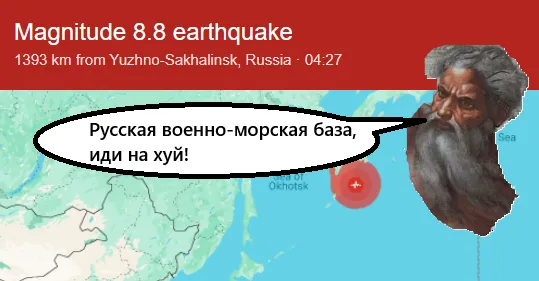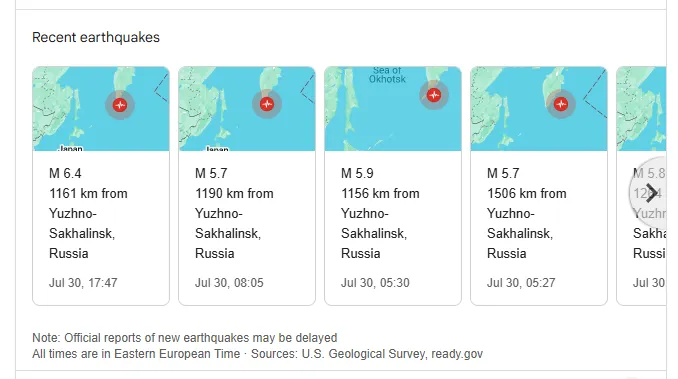
“Son of man, set your face against Gog, of the land of Magog, the chief prince(1) of Meshek(2) and Tubal(3); prophesy against him.
-Ezekiel 38:2
(1) "Chief Prince" is a really odd translation of "Nessi Rosh" in the original Hebrew, which could be better translated as "Prince of [a place called] Rosh."
(2) "Meshek," the Anglicization of the original Hebrew here, is the same spelling as the Hebrew word for "Moscow."
(3) Tobolsk. It's not even a translation, it is the same name for the same city from the same source.
Well, the nation that claims to be fighting against "Western Satanism" even while they bomb churches and murder priests, has just had its nuclear credibility shattered, and it'll be pretty hard to blame the US, Europe, or China for this one.
At 11:24 AM local time, on 30 July (23:24 July 29th GMT), a magnitude 8.8 earthquake struck under the sea just off the coast of Russia's Kamchatka Peninsula, about 120 kilometers (75 miles) from Petropavlovsk-Kamchatsky. This is notable for a few reasons. First of all because an 8.8 quake is massive. It was the highest recorded in 70 years (the Richter Scale goes to 10 and the highest ever recorded was 9.5). Secondly, because the quake's epicenter is only a few miles from Vilyuchinsk - the only (let me slam that word home again: only) Pacific base housing Russia’s nuclear submarines.
So, what does that mean?
Well, if Russia's Pacific fleet's nuclear submarines were in port at the time the earthquake struck, there's a good chance they were scuttled or at least badly damaged, and it's pretty hard to believe the port itself will still be useable. And if they weren't, then they now don't have a home port to return to.
The quake wasn't isolated either. Foreshocks and aftershocks have ranged from 5.7 to 6.9, any of which would be a significant quake in its own right.
Less than 24 hours later (and likely caused by the same tectonic activity), the Klyuchevskaya Sopka volcano, the largest active volcano in the Northern hemisphere, began erupting. It's too soon after the eruption for me to have found any news about where the eruption ranks on the VEI scale (in fact it might not even have a rating yet if it is still in progress, since the VEI scale measures the total amount of volcanic material discharged), but it's not a small event (nor is it isolated, since this volcano has erupted at least four times that I've found reports of this year alone).
Now admittedly, the volcano and the base are almost 380 km apart (roughly the distance from Atlanta to Nashville, for my US readers), so it will have to be a catastrophic eruption for any actual incandescent lava from this volcano to impact the base. However, for an ash cloud to cause damage 380 km away from its source is quite easy, especially if that base is reeling from an 8.8 earthquake and the subsequent resulting tsunami (which was oddly soft-handed in its impact on any of the other nations it hit).
So, what does the loss of this base's functionality mean for Russia? Well, since this base is the only one housing Russia's nuclear submarine fleet, it means Russia's second-strike capability has just been decimated.
For the laymen, "Second-strike capability" refers to a nation's assured ability to respond with a powerful nuclear counterattack even after suffering a devastating first strike from an enemy. It is the backbone of credible nuclear deterrence—ensuring that no adversary would launch a nuclear attack in the first place, knowing they would face inevitable and catastrophic retaliation. This doctrine relies on survivable nuclear assets, such as submarines armed with ballistic missiles, that can remain hidden and operational even in the event of a surprise assault on land-based forces.
In Russia’s case, submarine-launched ballistic missile (SLBM) platforms, like those stationed at the Vilyuchinsk base on the Kamchatka Peninsula, are a crucial part of that second-strike arsenal. If an earthquake or natural disaster damages the base’s infrastructure or affects the readiness of its ballistic missile submarines, it could significantly weaken the credibility of Russia’s deterrent posture. In other words, Russia, who has been rattling a nuclear sabre for years, has just lost the ability to guarantee they have any nukes to hit back with if NATO strikes them first. This means if NATO decides to call Putin's bluff, he now has no cards to play except "umm... pweeze no usez nookz, kay?"
In short, a natural disaster just erased Russia's ability to pretend they are a strategic peer of the US. In fact, Russia is now utterly at the mercy of ANY nuclear power with enough warheads to hit all their silos (and they haven't got many left that actually operate).
You Can't Give NATO the Blame Credit for This One
There's something else worth mentioning here. Contrary to the fantasies of conspiracy theorist whackjobs, there's no weapon in any NATO nation's arsenal -or the arsenal of any other nation on Earth for that matter- that can cause earthquakes (notwithstanding the minor aftershocks from an underground nuclear detonation), and certainly nothing that could cause one on this scale, with this level of aftershocks and foreshocks, or cause enough ripples in the magma layer to trigger volcanic activity as an aftereffect.
And oh, it's going to be hilarious to read replies from dozens of them spamming Youtube links to tinfoil hat lunatics here to try and say "YeS dEr Iz!!! EjUkAiT yUrSeLf!! NARF!!!"
But I digress.
The point is, two major natural within 24 hours of each other just slammed right into one leg (the seaborne one; the Ukrainians already obliterated the airborne one with Operation Spiderweb) of Russia's nuclear triad, less than a week after Russia's capital was hit by record-breaking floods (75-85 mm in under two hours, 91 mm by the time the storm passed 12 hours later, making this Moscow's wettest day since they started keeping records in 1879 and shattering the previous record set during summer storm 'Edgar' last year). There's no spin that can be put on this to claim it was manmade. There has been a consistent pattern of natural disasters hammering Russia and pummeling its major cities, while being suspiciously soft on the neighboring countries, ever since Russia launched their Special Genocide Operation in February 2022.
It's enough to make you see that there's Somebody who's got Ukraine's back. And it's beginning to look like He's getting tired of giving the Kremlin chance after chance to quit.
